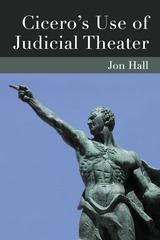
While Cicero’s Use of Judicial Theater will be of interest primarily to professional scholars and students studying the speeches of Cicero, its wider analyses, both of Roman cultural customs and the idiosyncratic practices of the courts, will prove relevant also to social historians, as well as historians of legal procedure.

Mock trial—Roman style.
Roman secondary education aimed principally at training future lawyers and politicians. Under the late Republic and the Empire, the main instrument was an import from Greece: declamation, the making of practice speeches on imaginary subjects. There were two types of such speeches: controversiae on law-court themes, suasoriae on deliberative topics. On both types a prime source of our knowledge is the work of Lucius Annaeus Seneca, a Spaniard from Cordoba, father of the distinguished philosopher. Towards the end of his long life (?55 BC–?AD 40) he collected together ten books devoted to controversiae (some only preserved in excerpt) and at least one (surviving) of suasoriae. These books contained his memories of the famous rhetorical teachers and practitioners of his day: their lines of argument, their methods of approach, their idiosyncrasies, and above all their epigrams. The extracts from the declaimers, though scrappy, throw invaluable light on the influences that colored the styles of most pagan (and many Christian) writers of the Empire. Unity is provided by Seneca’s own contribution, the lively prefaces, engaging anecdotes about speakers, writers, and politicians, and brisk criticism of declamatory excess.
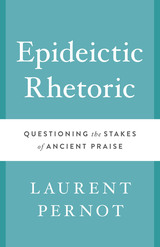
Speeches of praise and blame constituted a form of oratory put to brilliant and creative use in the classical Greek period (fifth to fourth century BC) and the Roman imperial period (first to fourth century AD), and they have influenced public speakers through all the succeeding ages. Yet unlike the other classical genres of rhetoric, epideictic rhetoric remains something of a mystery. It was the least important genre at the start of Greek oratory, but its role grew exponentially in subsequent periods, even though epideictic orations were not meant to elicit any action on the part of the listener, as judicial and deliberative speeches attempted to do. So why did the ancients value the oratory of praise so highly?
In Epideictic Rhetoric, Laurent Pernot offers an authoritative overview of the genre that surveys its history in ancient Greece and Rome, its technical aspects, and its social function. He begins by defining epideictic rhetoric and tracing its evolution from its first realizations in classical Greece to its eloquent triumph in the Greco-Roman world. No longer were speeches limited to tribunals, assemblies, and courts—they now involved ceremonies as well, which changed the political and social implications of public speaking. Pernot analyzes the techniques of praise, both as stipulated by theoreticians and as practiced by orators. He describes how epideictic rhetoric functioned to give shape to the representations and common beliefs of a group, render explicit and justify accepted values, and offer lessons on new values. Finally, Pernot incorporates current research about rhetoric into the analysis of praise.

Rhetorical remnants.
The Loeb Classical Library series Fragmentary Republican Latin continues with oratory, an important element of Roman life from the earliest times, essential to running public affairs and for advancing individual careers long before it acquired literary dimensions, which happened once orators decided to write up and circulate written versions of their speeches after delivery.
Beginning with Appius Claudius Caecus (340–273 BC), this three-volume edition covers the full range of speech-making—political, juridical, and epideictic (display)—and with the exceptions of Cato the Elder and Cicero includes all individuals for whom speech-making is attested and for whose speeches quotations, descriptive testimonia, or historiographic recreations survive.
Such an overview provides insight into the typical forms and themes of Roman oratory as well as its wide variety of occasions and styles. By including orators from different phases within the Republican period as well as men given high or low rankings by contemporaries and later ancient critics, the collection offers a fuller panorama of Roman Republican oratory than a selection guided simply by an orator’s alleged or canonical quality, or by the amount of evidence available.
This edition includes all the orators recognized by Malcovati and follows her numbering, but the texts have been drawn from the most recent and reliable editions of the source authors and revised in light of current scholarship; additional material has been included with its own separate numbering. Helping to guide readers through the material are faithful translations, informative introductions, and ample annotation.

Rhetorical remnants.
The Loeb Classical Library series Fragmentary Republican Latin continues with oratory, an important element of Roman life from the earliest times, essential to running public affairs and for advancing individual careers long before it acquired literary dimensions, which happened once orators decided to write up and circulate written versions of their speeches after delivery.
Beginning with Appius Claudius Caecus (340–273 BC), this three-volume edition covers the full range of speech-making—political, juridical, and epideictic (display)—and with the exceptions of Cato the Elder and Cicero includes all individuals for whom speech-making is attested and for whose speeches quotations, descriptive testimonia, or historiographic recreations survive.
Such an overview provides insight into the typical forms and themes of Roman oratory as well as its wide variety of occasions and styles. By including orators from different phases within the Republican period as well as men given high or low rankings by contemporaries and later ancient critics, the collection offers a fuller panorama of Roman Republican oratory than a selection guided simply by an orator’s alleged or canonical quality, or by the amount of evidence available.
This edition includes all the orators recognized by Malcovati and follows her numbering, but the texts have been drawn from the most recent and reliable editions of the source authors and revised in light of current scholarship; additional material has been included with its own separate numbering. Helping to guide readers through the material are faithful translations, informative introductions, and ample annotation.

Rhetorical remnants.
The Loeb Classical Library series Fragmentary Republican Latin continues with oratory, an important element of Roman life from the earliest times, essential to running public affairs and for advancing individual careers long before it acquired literary dimensions, which happened once orators decided to write up and circulate written versions of their speeches after delivery.
Beginning with Appius Claudius Caecus (340–273 BC), this three-volume edition covers the full range of speech-making—political, juridical, and epideictic (display)—and with the exceptions of Cato the Elder and Cicero includes all individuals for whom speech-making is attested and for whose speeches quotations, descriptive testimonia, or historiographic recreations survive.
Such an overview provides insight into the typical forms and themes of Roman oratory as well as its wide variety of occasions and styles. By including orators from different phases within the Republican period as well as men given high or low rankings by contemporaries and later ancient critics, the collection offers a fuller panorama of Roman Republican oratory than a selection guided simply by an orator’s alleged or canonical quality, or by the amount of evidence available.
This edition includes all the orators recognized by Malcovati and follows her numbering, but the texts have been drawn from the most recent and reliable editions of the source authors and revised in light of current scholarship; additional material has been included with its own separate numbering. Helping to guide readers through the material are faithful translations, informative introductions, and ample annotation.

Mock trial—Roman style.
The Lesser Declamations, dating perhaps from the second century AD and attributed to Quintilian, might more accurately be described as emanating from “the school of Quintilian.” The collection—here made available for the first time in translation—represents classroom materials for budding Roman lawyers.
The instructor who composed these specimen speeches for fictitious court cases adds his comments and suggestions concerning presentation and arguing tactics—thereby giving us insight into Roman law and education. A wide range of scenarios is imagined. Some evoke the plots of ancient novels and comedies: pirates, exiles, parents and children in conflict, adulterers, rapists, and wicked stepmothers abound. Other cases deal with such matters as warfare between neighboring cities, smuggling, historical (and quasi-historical) events, tyrants and tyrannicides. Two gems are the speech opposing a proposal to equalize wealth, and the case of a Cynic youth who has forsworn worldly goods but sues his father for cutting off his allowance.
Of the original 388 sample cases in the collection, 145 survive. These are now added to the Loeb Classical Library in a two-volume edition, a fluent translation by D. R. Shackleton Bailey facing an updated Latin text.

Mock trial—Roman style.
The Lesser Declamations, dating perhaps from the second century AD and attributed to Quintilian, might more accurately be described as emanating from “the school of Quintilian.” The collection—here made available for the first time in translation—represents classroom materials for budding Roman lawyers.
The instructor who composed these specimen speeches for fictitious court cases adds his comments and suggestions concerning presentation and arguing tactics—thereby giving us insight into Roman law and education. A wide range of scenarios is imagined. Some evoke the plots of ancient novels and comedies: pirates, exiles, parents and children in conflict, adulterers, rapists, and wicked stepmothers abound. Other cases deal with such matters as warfare between neighboring cities, smuggling, historical (and quasi-historical) events, tyrants and tyrannicides. Two gems are the speech opposing a proposal to equalize wealth, and the case of a Cynic youth who has forsworn worldly goods but sues his father for cutting off his allowance.
Of the original 388 sample cases in the collection, 145 survive. These are now added to the Loeb Classical Library in a two-volume edition, a fluent translation by D. R. Shackleton Bailey facing an updated Latin text.

Private correspondence and dubious disquisitions.
Cicero had an affectionate relationship with his only brother, Quintus, down to the closing years of their lives. The letters from Cicero to him in this collection offer an intimate look at their world. Cicero’s close friendship with the intensely intellectual Brutus was signalized by Cicero’s dedication of his prized Orator to Brutus. The correspondence between the two collected here dates from the spring and summer of 43 BC, and it conveys some of the drama of the period following the assassination of Julius Caesar.
Shackleton Bailey also provides in this volume a new text and translation of two invective speeches purportedly delivered in the Senate: Sallust attacking Cicero and Cicero attacking Sallust. These are probably anonymous ancient schoolbook exercises, but have come down to us with the works of Sallust and Cicero. Another work in the same category, the Letter to Octavian ostensibly by Cicero but probably dating from the third or fourth century AD, is included as well. Here too (with text by Shackleton Bailey and revised introduction and translation by M. I. Henderson) is the Handbook of Electioneering, a guide said to be written by Quintus to his brother, advising him on campaigning for the consulship of 63 BC. Whether or not this is genuinely the work of Quintus, it remains an interesting treatise on Roman elections. Letter fragments complete the volume; these were not previously available in the Loeb Classical Library.

Mock trial—Roman style.
The Major Declamations stand out for their unique contribution to our understanding of the final stage in Greco-Roman rhetorical training. These exercises, in which students learned how to compose and deliver speeches on behalf of either the prosecution or the defense at imaginary trials, demonstrate how standard themes, recurring situations and arguments, and technical rules were to be handled by the aspiring orator. And what is more, they lay bare the mistakes that students often made in this process.
Declamation was practiced in the ancient world from as early as the fifth century BC, but most of its vast tradition has disappeared. The surviving material is mainly in Greek, from the second century AD onward. In Latin the nineteen declamations in the present anthology are by far the most important evidence. In antiquity they were attributed to Quintilian, but they are now thought to be the work of several authors and to date from around AD 100 to the mid- or late third century.
A wide variety of fascinating ethical, social, and legal details animates the fictional world conjured up by these oratorical exercises, and although the themes of declamation can be unrealistic and even absurd (often reminiscent of ancient novel and tragedy), they seem to provide a safe space in which a student could confront a range of complex issues, so as to attain both the technical knowledge necessary to speak persuasively and the soft skills needed to manage the challenges of adult life under the Roman empire.

Mock trial—Roman style.
The Major Declamations stand out for their unique contribution to our understanding of the final stage in Greco-Roman rhetorical training. These exercises, in which students learned how to compose and deliver speeches on behalf of either the prosecution or the defense at imaginary trials, demonstrate how standard themes, recurring situations and arguments, and technical rules were to be handled by the aspiring orator. And what is more, they lay bare the mistakes that students often made in this process.
Declamation was practiced in the ancient world from as early as the fifth century BC, but most of its vast tradition has disappeared. The surviving material is mainly in Greek, from the second century AD onward. In Latin the nineteen declamations in the present anthology are by far the most important evidence. In antiquity they were attributed to Quintilian, but they are now thought to be the work of several authors and to date from around AD 100 to the mid- or late third century.
A wide variety of fascinating ethical, social, and legal details animates the fictional world conjured up by these oratorical exercises, and although the themes of declamation can be unrealistic and even absurd (often reminiscent of ancient novel and tragedy), they seem to provide a safe space in which a student could confront a range of complex issues, so as to attain both the technical knowledge necessary to speak persuasively and the soft skills needed to manage the challenges of adult life under the Roman empire.

Mock trial—Roman style.
The Major Declamations stand out for their unique contribution to our understanding of the final stage in Greco-Roman rhetorical training. These exercises, in which students learned how to compose and deliver speeches on behalf of either the prosecution or the defense at imaginary trials, demonstrate how standard themes, recurring situations and arguments, and technical rules were to be handled by the aspiring orator. And what is more, they lay bare the mistakes that students often made in this process.
Declamation was practiced in the ancient world from as early as the fifth century BC, but most of its vast tradition has disappeared. The surviving material is mainly in Greek, from the second century AD onward. In Latin the nineteen declamations in the present anthology are by far the most important evidence. In antiquity they were attributed to Quintilian, but they are now thought to be the work of several authors and to date from around AD 100 to the mid- or late third century.
A wide variety of fascinating ethical, social, and legal details animates the fictional world conjured up by these oratorical exercises, and although the themes of declamation can be unrealistic and even absurd (often reminiscent of ancient novel and tragedy), they seem to provide a safe space in which a student could confront a range of complex issues, so as to attain both the technical knowledge necessary to speak persuasively and the soft skills needed to manage the challenges of adult life under the Roman empire.

Invectives against Antony.
Cicero (Marcus Tullius, 106–43 BC), Roman advocate, orator, politician, poet, and philosopher, about whom we know more than we do of any other Roman, lived through the stirring era that saw the rise, dictatorship, and death of Julius Caesar in a tottering republic. In Cicero’s political speeches and in his correspondence we see the excitement, tension, and intrigue of politics and the part he played in the turmoil of the time. Of about 106 speeches, 58 survive (a few incompletely), 29 of which are addressed to the Roman people or Senate, the rest to jurors. In the fourteenth century Petrarch and other Italian humanists discovered manuscripts containing more than 900 letters, of which more than 800 were written by Cicero, and nearly 100 by others to him. This correspondence affords a revelation of the man, all the more striking because most of the letters were not intended for publication. Six works on rhetorical subjects survive intact and another in fragments. Seven major philosophical works are extant in part or in whole, and there are a number of shorter compositions either preserved or known by title or fragments.
The Loeb Classical Library edition of Cicero is in twenty-nine volumes.

Invectives against Antony.
Cicero (Marcus Tullius, 106–43 BC), Roman advocate, orator, politician, poet, and philosopher, about whom we know more than we do of any other Roman, lived through the stirring era that saw the rise, dictatorship, and death of Julius Caesar in a tottering republic. In Cicero’s political speeches and in his correspondence we see the excitement, tension, and intrigue of politics and the part he played in the turmoil of the time. Of about 106 speeches, 58 survive (a few incompletely), 29 of which are addressed to the Roman people or Senate, the rest to jurors. In the fourteenth century Petrarch and other Italian humanists discovered manuscripts containing more than 900 letters, of which more than 800 were written by Cicero, and nearly 100 by others to him. This correspondence affords a revelation of the man, all the more striking because most of the letters were not intended for publication. Six works on rhetorical subjects survive intact and another in fragments. Seven major philosophical works are extant in part or in whole, and there are a number of shorter compositions either preserved or known by title or fragments.
The Loeb Classical Library edition of Cicero is in twenty-nine volumes.
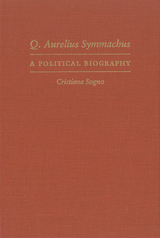
Symmachus was a brilliant orator, writer, and statesman, often flatly labeled as one of the last pagan senators. Cristiana Sogno offers a reconstruction of the political career of Symmachus through close analysis of his extensive writings, while also proposing a critical reevaluation of his historical importance. In contrast to traditional interpretation, Sogno's study demonstrates that Symmachus was primarily an influential politician, rather than a mere pagan zealot.
By portraying the individual experience of Symmachus, the book sets forth a new approach for interpreting the political aspirations, mentality, and attitudes of Roman senators. The much-studied question of the Christianization of the Western aristocracy has created the illusion of a Christian and a pagan aristocracy rigidly separated from each other. Through her study of Symmachus, Sogno demonstrates the primary importance of politics over religion in the public activity of the late Roman aristocracy. Although the book is specifically addressed to scholars and students of Late Antiquity, it will also be of interest to classicists, ancient historians, and non-specialists who wish to know more about this pivotal period in Roman history.
Cristiana Sogno received her Ph.D. in Classics and History from Yale University. Currently she is Townsend Assistant Professor of Classics at Cornell University. Visit Professor Sogno's website at: http://www.fordham.edu.
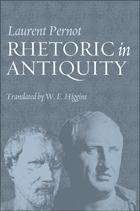
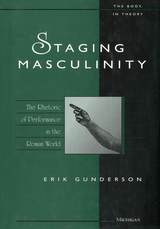
Erik Gunderson explores these and other questions in ancient rhetorical theory using a variety of theoretical approaches, drawing in particular on the works of Judith Butler, Michel Foucault, and Jacques Lacan. His study examines the status of rhetorical theory qua theory, the production of a specific version of body in the course of its theoretical description, oratory as a form of self-mastery, the actor as the orator's despised double, the dangers of homoerotic pleasure, and Cicero's De Oratore, as what good theory and practice ought to look like.
Erik Gunderson is Assistant Professor of Greek and Latin, Ohio State University.
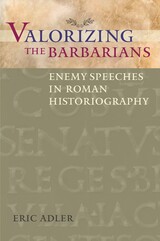
With the growth of postcolonial theory in recent decades, scholarly views of Roman imperialism and colonialism have been evolving and shifting. Much recent discussion of the topic has centered on the ways in which ancient Roman historians consciously or unconsciously denigrated non-Romans. Similarly, contemporary scholars have downplayed Roman elite anxiety about their empire's expansion.
In this groundbreaking new work, Eric Adler explores the degree to which ancient historians of Rome were capable of valorizing foreigners and presenting criticisms of their own society. By examining speeches put into the mouths of barbarian leaders by a variety of writers, he investigates how critical of the empire these historians could be.
Adler examines pairs of speeches purportedly delivered by non-Roman leaders so that the contrast between them might elucidate each writer's sense of imperialism. Analyses of Sallust's and Trogus's treatments of the Eastern ruler Mithradates, Polybius's and Livy's speeches from Carthage's Hannibal, and Tacitus's and Cassius Dio's accounts of the oratory of the Celtic warrior queen Boudica form the core of this study. Adler supplements these with examinations of speeches from other characters, as well as contextual narrative from the historians. Throughout, Adler wrestles with broader issues of Roman imperialism and historiography, including administrative greed and corruption in the provinces, the treatment of gender and sexuality, and ethnic stereotyping.
READERS
Browse our collection.
PUBLISHERS
See BiblioVault's publisher services.
STUDENT SERVICES
Files for college accessibility offices.
UChicago Accessibility Resources
home | accessibility | search | about | contact us
BiblioVault ® 2001 - 2024
The University of Chicago Press









